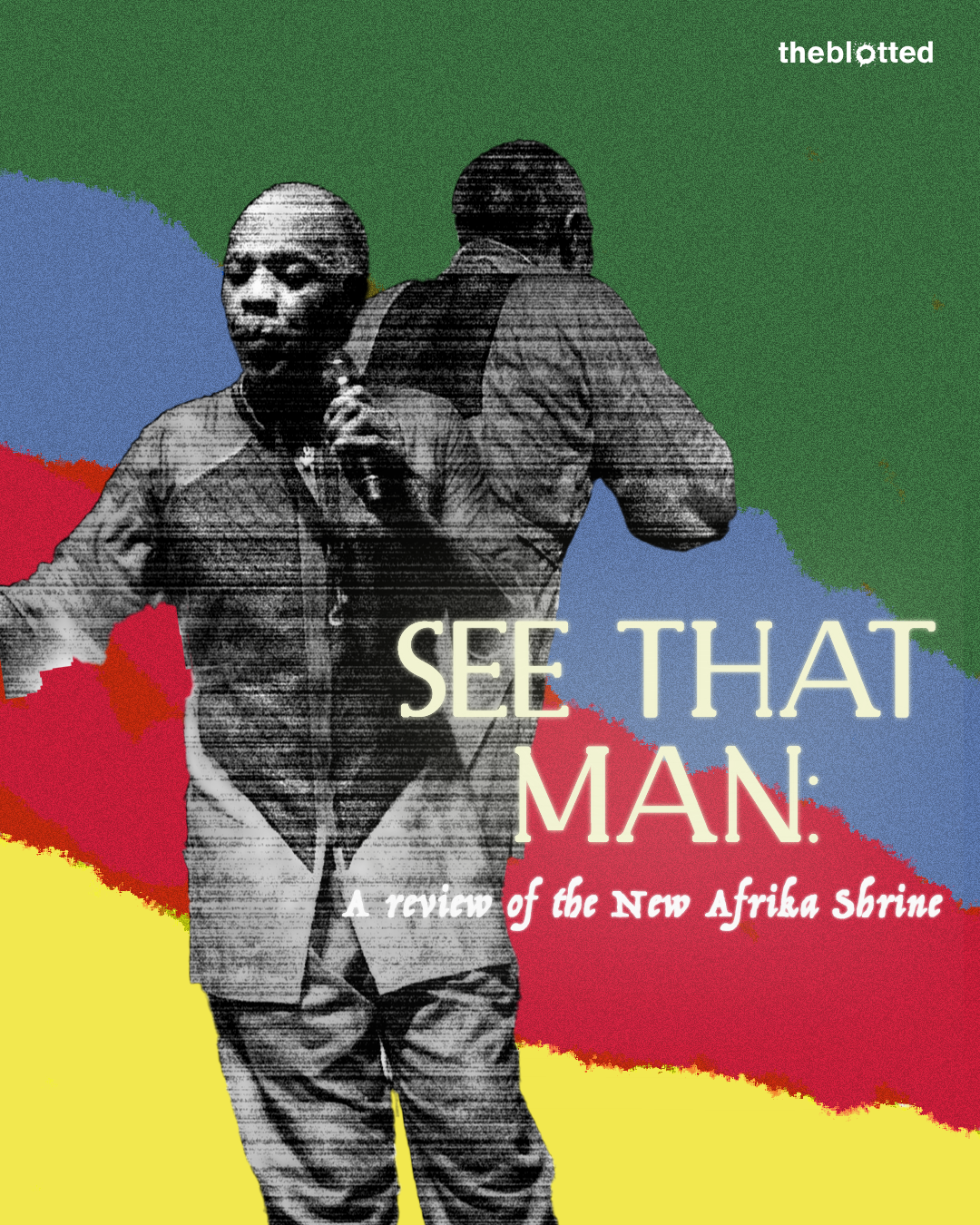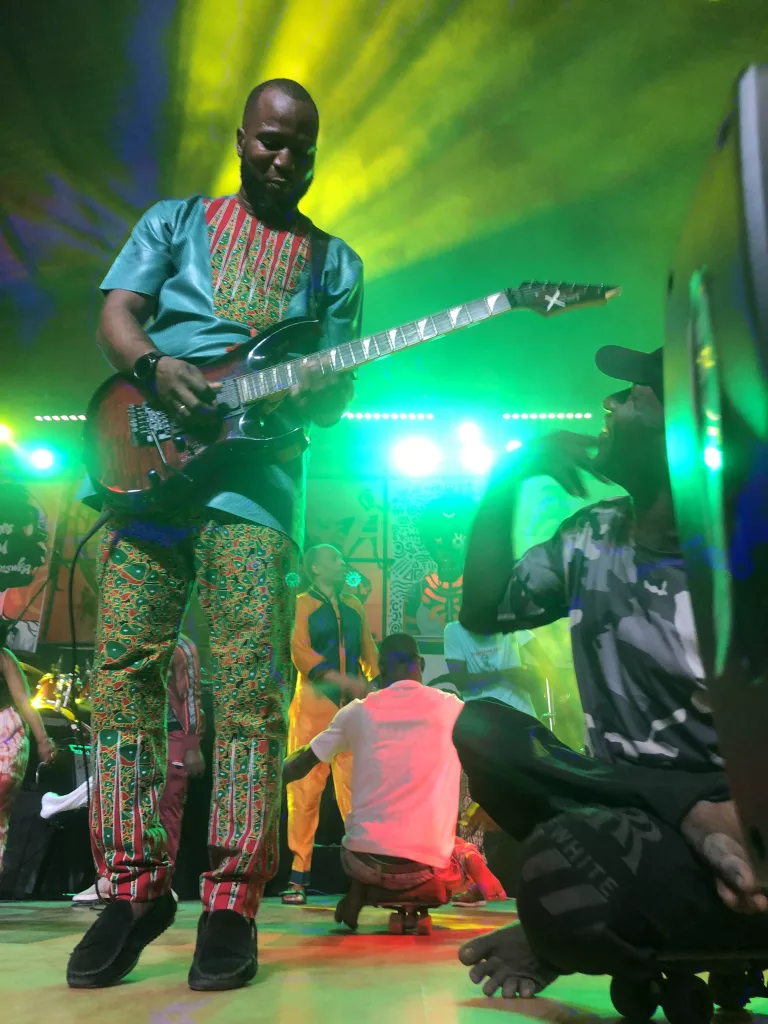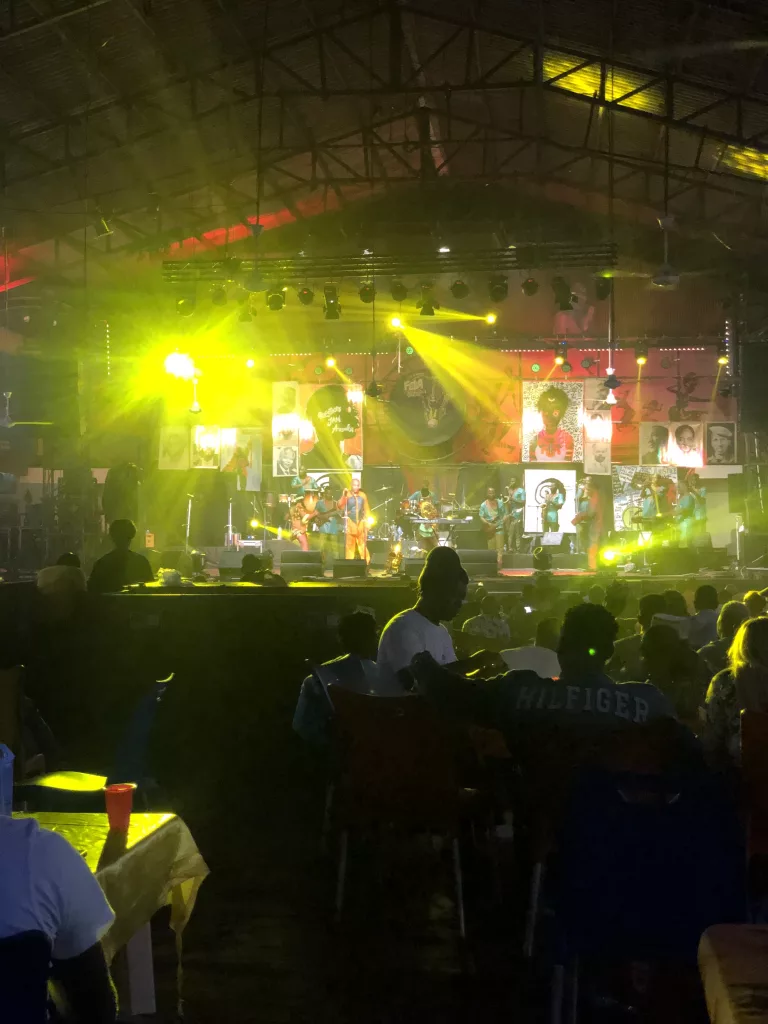See That Man: A Review of Femi Kuti and the New Afrika Shrine

This is a quality assured, rubber stamped, peer reviewed and expert co-signed critique of Femi Kuti’s electric, and vibrant Sunday shows at the New Afrika Shrine in Ikeja. Last week, they raised the entry fee from one thousand naira to two, and everyone was surprised. But the more pressing question remains: is it worth it? For real, is 2k worth seeing 61-year-old Afrobeat legend Femi Kuti busting moves like he’s about to turn 24; chorus-crooning, ideology-spouting Femi Kuti alongside blasting horns, and flashy dancers? Is it really worth your dime and most importantly, your time?
Let’s get the basics out of the way: Femi Kuti is Fela’s son, you know—two hands in the air, afropolitan musical genius Fela Anikulapo Kuti that has a Broadway show named after him. Fela’s life was one of eccentricity and a fiery passion for restoring dignity in the common man. He swung his doors open and called his home a shrine. This shrine was where he hosted all who cared to listen to his protest through music. Fela performed for all till he passed on in the early 90s. His son, Femi has managed to not only keep his father’s legacy and ideology alive, but the community too—at great expense, if i might add.
Now, The New Afrika Shrine holds freedom as atmosphere. Spacious, airy, the walls are adorned with portraits of air-punching, statement-making political archetypes. The shrine is self-sustaining, and kind of panders to tourists—there is a merchandise shop, jewelry store, vape store, different kinds of food vendors, a bar and all sorts of advertisements chipped in by different brands. To refuse to pander, one has to pander to some degree. There’s a level of protest surcharged into the environment. Ideologies abound, and being here makes you want to stand for something and fight the power. You are, afterall among like minds. Femi’s music also toes this line, performing hit after hit of records dipped in political angst.
Femi Kuti is quick on his feet; he runs the length of the stage multiple times. He tap-dances, he jumps– if he could summersault, he would have. He strikes picture perfect poses and holds still long enough for attendees to capture the moment. Every one of Femi’s songs are messages to the Nigerian people. Records like “As we struggle everyday” is a Dickensian anthem, “Show of Shame” mocks African political leaders, “You can’t fight corruption with corruption” advises. When he is not advocating for peace or imparting ideals, he’s educating listeners on how they’re being cheated every single day—and his tone is almost derisive, like he’s daring you to do something about it.
“Them bobo your grandpa
Them bobo your papa
Them bobo you too”
Bobo, in this context alludes to “deceive”—culled from a processed sugar and milk drink here in Nigeria, often made in small bottles and given to children. If one dwells on the lyrics, anger is certain, but the music, beautifully and brilliantly performed; intoxicates.
The best spot in-house is right in front, standing in an empty area by the stage. Femi Kuti, while singing will sometimes lock eyes with you, and if you motion for a fist bump he might even oblige… heavy on the might though. There are cripples, artisans, motorcycle riders, area boys, business men, writers, artists– white, black, mixed, any and every combination you can think of taking in both music and history. It is akin to visiting a living, breathing relic. You can tell this is a ritual that will be remembered for years to come.
The New Afrika Shrine is home to all. Lola Shoneyin, fresh from a successful Ake Festival accompanies some of the international literatis to witness this event. A middle aged man brings his woman to the front to meet Femi during his performance to establish that he’s a “shrine boy”. At a point, various members on the dance floor were tapped to join Femi onstage, a cripple rolls to the guitarist as he soloed, they share a moment of eye contact. Even the common man becomes a superstar for five minutes.

A guitarist and a superstar
Femi banters with the crowd after certain songs, Yabis, it’s called. He does this so his dancers and band members can catch their breath. He broaches topics like recent fuel prices and struggles they face to keep the lights on at the shrine. He talks about Seun’s social media clash. He addresses the increase in gate fee and tells the people that he hates increasing prices, and even this hike is not enough, but they have to keep it low to ensure it is accessible even to the lowest rung of our society.
While Femi Kuti ran through his set, somewhere in the hall, newly married Made Kuti, his son, played pool with an attendee. The Kuti sister, Yeni sits front row, and throws an empty water bottle at Femi after one of the songs. Femi throws it back in jest. Unlike the usual Nigerian shows, the presence of a literal and metaphoric barricade between star and people is absent. There really is no need for a backstage. The shrine simply oozes energy. There is a culture too, everyone is polite and helpful. Sometimes, a whiff of loud arrests the air, but right at the entrance, it is legibly written that smoking of illegal substances are prohibited and that is that about that.
Femi, greyed out hair in an orange fit, plays the famed afrobeat midi tune on his piano. A bottle of water sits right where the speaker should be, but the sound is amplified to over 14 speakers for this performance. Femi Kuti can be playing anywhere around the earth right now, for larger audiences non-hesitant to pay top dollar for his talent and experience. This man; a world class, formally trained musician over the past 28 years chooses to perform for one thousand naira every sunday to show the masses what greatness looks and feels like, and to encourage them that they too can be great like him. This is true sacrifice.
Taking in the view from the back, the stage towers at over 20 feet. Colored lights programmed to the music’s ever changing tempo dart around the stage. The band members’ green damask fabric glint from time to time and The Kalakuta Queens are choreographed to a beat. The sheer effort put into this production is masterful, the Kutis spare little costs.
While the performance embodies individual empowerment up-close, there is poetry from afar—it resembles the shrieking cry of the masses, and brings to the fore decades of Nigeria’s stagnation and hopelessness. It is a carnival for all, but most importantly, it is a spectacle about the poor and the fact that they get to see it every Sunday should not go unnoticed.



New Afrika Shine, Femi Kuti Performing
The final third of the performance is a personal favourite. Femi performs Shotan, afrobeat fused with hard rock and punk elements, he even sings in a growly register for proper head nods and mosh pits. Afterwards, he does a powerful rendition of a spiritual record where he scat sings (I cannot find this song anywhere, has it been released?) Femi then transitions into more emotional parts of his set and then completes the sequence with an outlandish solo. It is beautiful, it is the Nigerian story wrapped in sound. You can feel the potential, the struggle, the sadness of this story.
Femi breathes colour into his tenor saxophone. The lights turn red– the music is dreary, and hopeless. So much splendor, strength, woe. There really is something gripping about the way he plays that says more about how he feels for Nigeria than all the singing he had done all night. Almost like he has given up on the dream, or he feels his generation has done what it could. Femi Kuti is breathless.
His son, Made then continues the solo. He sustains a note for what seems like hours, his father holds this particular world record but Made doesn’t intend to break that record here. Made Kuti dilutes Femi’s agony with hope, he makes a case for the future– the lights are blue. Seeing father and son perform like this is a full circle moment, Femi is amazed at his son’s adeptness, but moreso, proud of how far he has come and the kind of Kuti he is.
The show ends after one more song and the man leaves briskly. The lead guitarist takes over and sings a tune praising Femi’s prowess on stage, the Kalakuta Queens dance out as they must have rehearsed and the singer fades out the music slowly to ease us out of this euphoria. Stage lights go dark and everyone troops out to make their way home—empowered by the individual show of brilliance, and thankful that this exists.
If you’re in Lagos or plan on visiting Lagos, the New Afrika Shrine is a must-add to your itinerary. See that man!
Oyedele Alokan is passionate about culture and arts. Engage on instagram and twitter, @omoalokan


NO COMMENTS